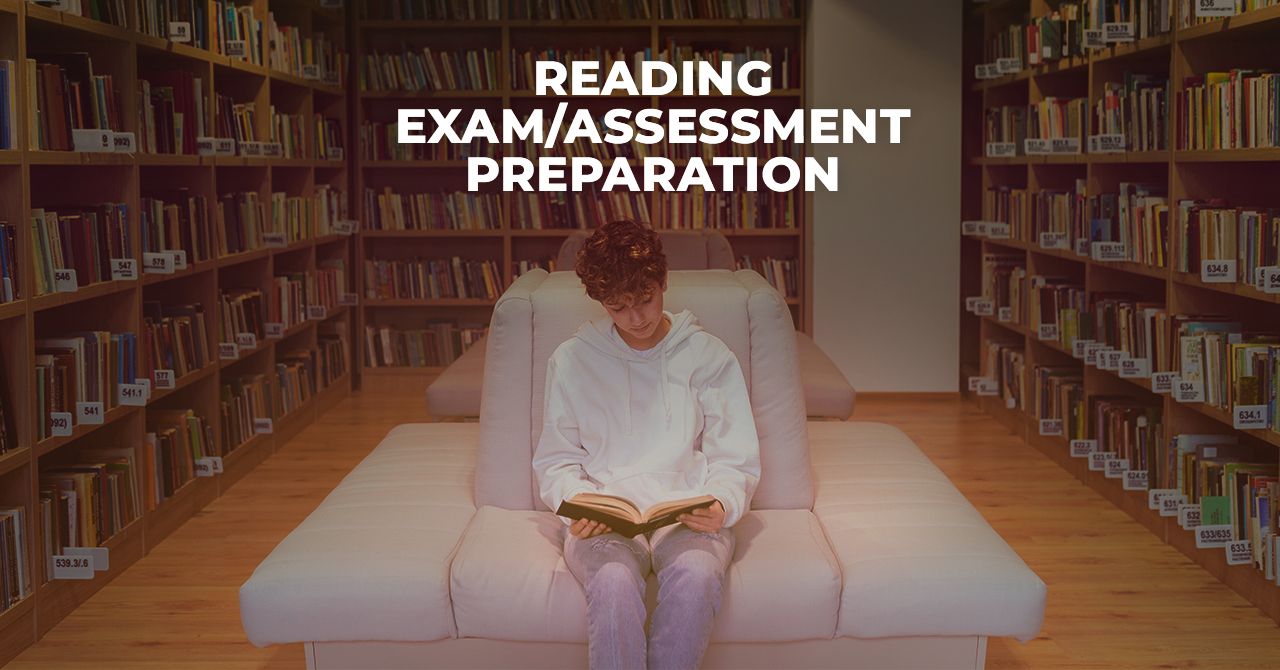
Preparing for a Reading Exam/Assessment
A positive attitude goes a long way to being successful - if you have practiced the skills and suggestions listed below you will feel more confident of doing well.

Get a FREE guide!
Want to sound like a native English speaker?
Get our free PDF with top tips that work.

Check your email!
Reading Exams/Assessments tend to be the less stressful of the four disciplines (Reading, Writing, Speaking, Listening). Unlike other disciplines, you can go back and look at the source material as many times as you desire. However, is it still not easy! – there are some techniques that can be of great help to you to prepare beforehand and use during the exam assessment.
A positive attitude goes a long way to being successful - if you have practiced the skills and suggestions listed below you will feel more confident of doing well.
I have made suggestions for what you need to do at least a week before the exam/assessment, what to do when you receive your text and questions, what to do during the test time, and what you should do when you have finished answering.
Things to do at least a week before the exam/assessment day
You need to be constantly working on improving your vocabulary and grammar as well as revising notes. (See vocabulary and grammar suggestions below).
If your exam/assessment is on a topic you have been studying in class this gives you a great advantage as you are already familiar with the material you need to focus on. So go through your notes thoroughly.
If your exam/assessment is on a general topic you can ask your teacher to give you some hints as to what the topic will be. If they are not willing or able to do this don’t panic. The exam/assessment has been designed to see how well you can answer questions on a general topic NOT your ability to understand the topic.
Vocabulary
The Academic Word List (AWL) was developed by Averil Coxhead at the School of Linguistics and Applied Language Studies at Victoria University of Wellington, New Zealand for her MA Thesis. Download a copy from here.
The list contains 570-word families which were selected because they appear with great frequency in a broad range of academic texts.
If you click on the link you will be taken to a website where you can do practice exercises with words from the list – it is particularly good because it also offers definitions of each of the words in the list.
Grammar
So many rules and exceptions that can easily drive you crazy!
This website is great as not only does it have a range of quizzes – Beginner, Intermediate & Advanced but it also has other great reference materials such as Idioms, Phrasal Verbs, Irregular Verbs, and other fun activities for you to enjoy.
The only downside is that it does not explain why your answer was wrong, so I suggest you watch a YouTube video if you are having trouble with something.
Things to do just before the exam/assessment
It is all about prediction and preparation. You should have time to read through the questions, so you need to do the following:
Read through the questions first so that you get an overall idea about the exam/assessment. You need to do this regardless of how familiar you are with the material.
If you are allowed to use a dictionary (often it is a book dictionary as opposed to an e-dictionary) check any words you are not 100% on.
If you are not given time to look through the questions before the exam begins you still need to do the two tasks above once the exam begins as they will be of enormous help.
Things to do during the exam/assessment
In this guide, I will be focussing exclusively on answers that require 3 or 4 sentences only
Please refer to my other upcoming guides on answering Multiple Choice, True/False/Not given, Matching Paragraph Completion, and Sentence Completion for tips on those types of questions.
Once you are given permission to begin you need to skim through the text underling or highlighting names and numbers (see below) and other useful information related to the text, this will enable you to quickly locate the information you need to help answer a question.
Remember that the questions will follow the order of the text, so there is a very good chance that the answer to Question One will be somewhere in the first three or four paragraphs
Things you should ALWAYS HIGHLIGHT/UNDERLINE are:
Names – people, places, companies/businesses, government organizations, machines, educational institutes, etc
Numbers – dates, fractions, decimals, percentages, measurement (both Imperial: e.g. ounces, pounds, tons, and Metric: e.g. grams, kilograms, tonnes) quantities, distances, temperatures, etc
What to watch out for
From having marked hundreds of exams/assessments below are the common errors I have seen students making that cost them marks they could NOT afford to lose.
1. Not reading the question properly: Small words and phrases can make all the difference e.g. some/most/many/ a small percentage/the majority of… There is a big difference between all of these – so READ THE QUESTION CAREFULLY.
2. Going off-topic: I am sure it is interesting to know that your grandmother had to feed the chickens when she was a girl, but I very much doubt that that is related to the question being asked in any way.
3. Confusing fact and opinion: Fact - The All Blacks are the national Rugby Union Team of New Zealand. (Yes, this is true) Opinion – Everyone in New Zealand supports the All Blacks (How do you know? Have asked every single person in the country?)
4. Using words that sound similar but have very different meanings: Let’s look at density and destiny.
DENSITY (Think back to Geography class) is how much of something is in a given space e.g. the population density of Tokyo, Japan is 6,158 persons per square kilometer whereas the population density of Auckland, New Zealand is 1,210 people per square kilometer.
DESTINY: is the event(s) that will necessarily happen to a particular person or thing in the future e.g. It is the destiny of Prince Charles to become the next British monarch.
Getting these two words mixed up may get humourous results, but it won’t get you any marks.
What to Do During the Exam/Assessment
If there are three or four lines provided for you to write your answer then you should be using all or most of them – you should provide as much information as possible as this shows the marker you have a good understanding of the question.
Keep an eye on the time. If it is a two-hour exam you need to be around halfway through after one hour.
Make sure you have answered all the questions – yes I know it sounds basic, but if I had a dollar for every exam/assessment I have marked with a missing question I would have free cappuccinos every morning for a semester! (Double shot, no sugar thanks).
Check Your Answers
Don’t be too worried about any grammar, spelling, or punctuation errors. You are being tested on your ability to answer questions based on this topic, unless your answers are too confusing you shouldn’t lose any marks for small errors.
Have confidence that you have prepared well, read the questions so that you understood them and that you have answered to the best of your ability – hand in your answers and relax!
















